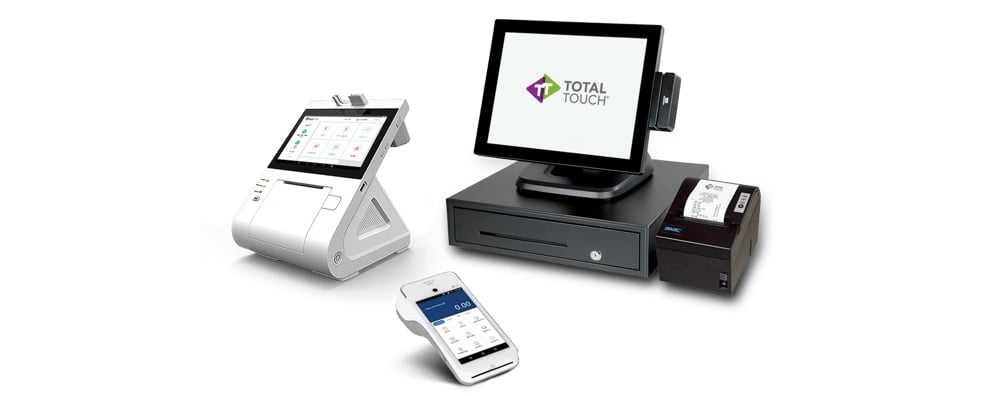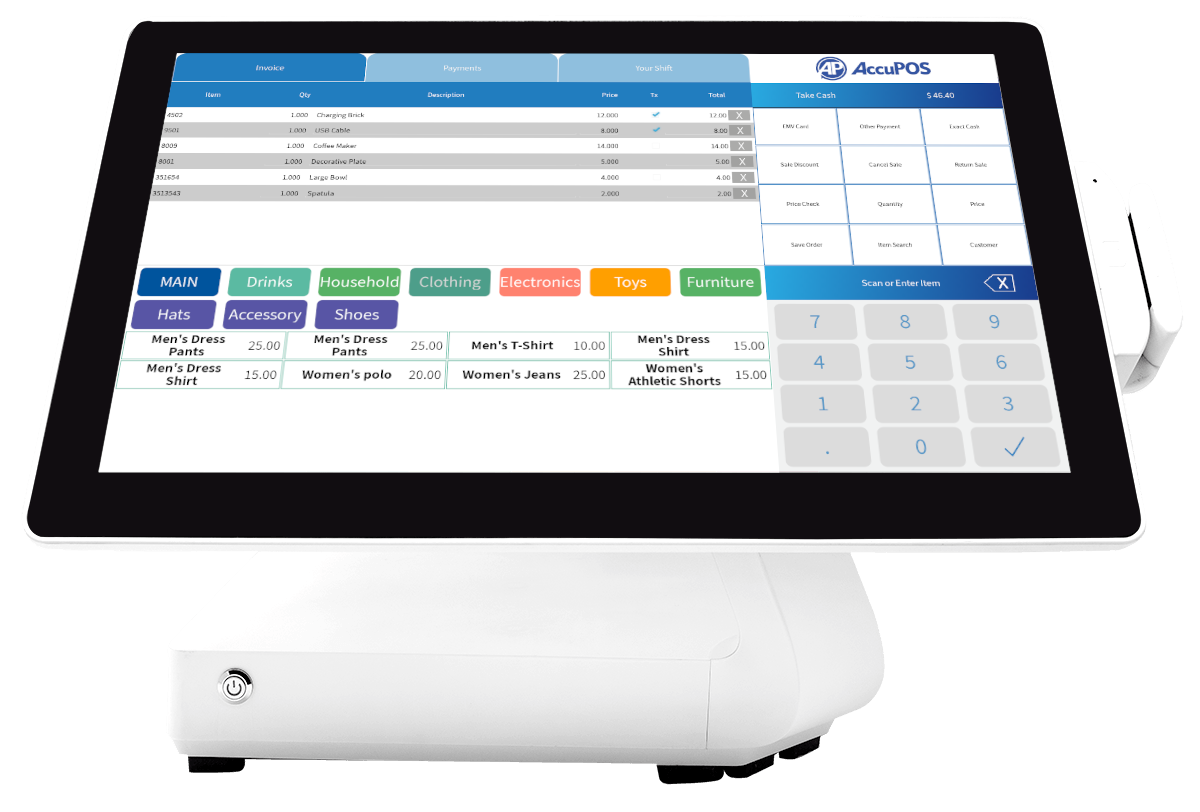10 Easy Facts About Pos Systems Shown
10 Easy Facts About Pos Systems Shown
Blog Article
6 Simple Techniques For Point Of Sale Systems

Point of Sale: Retail Point-Of-Sale Solutions Streamline Transactions
Clover Pos Fundamentals Explained

Hardware Elements of a Point of Sale System What makes a POS system tick? It's not simply software; the hardware plays a starring function. Think about it as the body to the software application's brain. Without the ideal hardware, even the most sophisticated POS software is just a pretty face. Important POS Hardware So, what are the must-haves? Let's simplify. The central processing unit, typically a computer system or tablet, is the heart of the operation. The display or touchscreen show permits staff to engage with the system. A barcode scanner accelerate the checkout procedure. Remember the days of by hand getting in each code? The trusty invoice printer offers clients with a record of their purchase. A cash drawer keeps your cash safe and organized. A card reader allows customers to pay with credit or debit cards. Diving Deeper: Beyond the Fundamentals But wait, there's more! Depending on your organization, you may require customized hardware. A restaurant might incorporate cooking area printers to relay orders, while a retail store may utilize label printers for item tagging. Ever wonder how your local bakery immediately prints those delicious-looking labels? Picking the Right Hardware: A Balancing Act Choosing the right hardware isn't practically purchasing the most pricey devices. It's about discovering the sweet spot in between performance, resilience, read more and budget. A small company just beginning out may choose a more standard setup, while a high-volume seller will require robust, high-performance devices. Is it better to buy new or utilized? Consider your choices thoroughly. A new system provides the latest innovation and warranty protection, however a refurbished system can conserve you cash. The Future of POS Hardware What does the future hold? Expect to see even more integration with mobile phones, biometric scanners for worker authentication, and advanced analytics dashboards showed on bigger, clearer screens. Imagine a world where stock is automatically upgraded in real-time as items are scanned-- a world where you can track your very popular product from anywhere in the world. The possibilities are unlimited, and the hardware is continually evolving to fulfill the needs these days's services. Are you ready to update your point of sale system?
Software Characteristics and Capabilities: The Heart of Your POS System
Ever watch a skilled barista move through a hectic morning rush? Their trick isn't just caffeine; it's a seamless dance with their POS system. The software is the conductor of your business symphony, managing everything from sales to inventory. But what notes should you be listening for? What abilities really matter in today's market?
Inventory Management: Beyond Counting Beans
Forget spreadsheets that haunt your dreams. Modern POS systems offer real-time inventory tracking, informing you when your stock of artisanal coffee beans dips precariously low. Consider it as a digital guardian angel, preventing those awkward "Sorry, we're out!" minutes to customers. What if you could also predict demand based upon historic data? Numerous systems now use forecasting tools, a powerful weapon versus overstocking and lost sales. This assists prevent the situation of running out of popular products or accumulating excess stock of slow-moving products, both of which can constrain capital and area.
Sales Reporting and Analytics: Decoding the Data
Sales data is the brand-new gold, and your POS system is the miner. Forget feeling in one's bones how much you offered today. Dive deep into the information to reveal patterns, recognize your best-selling products, and comprehend consumer behavior. Which menu item sets perfectly with the daily special? Which promo resonated most with your customers? These insights are not simply intriguing; they're actionable intelligence. Without trustworthy sales reporting, navigating the complexities of business decision-making becomes like sailing without a compass, increasing the possibility of mistakes and missed opportunities.
Client Relationship Management (CRM): Structure Bridges, Not Walls
Remembering a routine customer's name and favorite order is lovely, but scaling that personal touch is difficult. POS systems with CRM abilities permit you to track customer purchase history, preferences, and even birthdays. Imagine automatically providing a discount on their birthday-- a small gesture that promotes commitment and encourages repeat organization. There is the potential snag of bad information quality, which can lead to unreliable client profiles and inefficient marketing efforts.
Payment Processing: Enhancing the Deal
The checkout experience can make or break a sale. Smooth combination with various payment methods-- charge card, mobile wallets, even copyright-- is non-negotiable. Can your system deal with split payments? Does it use secure tokenization to protect customer information? A cumbersome payment process resembles hitting a sour note in your service symphony, potentially disrupting the entire performance. Ensuring compatibility with progressing payment technologies and adherence to security requirements are vital for keeping client trust and functional effectiveness.
Worker Management: Keeping the Group in Sync
From clocking in and out to managing approvals and tracking efficiency, employee management includes enhance operations and improve responsibility. Is scheduling a problem? Many POS systems use incorporated scheduling tools, optimizing staffing levels based upon forecasted demand. A typical challenge that is often overlooked is the difficulty of incorporating worker management functionalities with payroll systems, which can result in errors and inefficiencies in wage computations.
Advanced Characteristics: Leveling Up Your Operations
- Table Management: Ideal for dining establishments, this function enables you to imagine your dining-room, track table status, and manage bookings.
- Loyalty Programs: Reward your finest consumers and encourage repeat business with incorporated commitment programs.
- Online Purchasing Combination: Effortlessly integrate your POS system with online ordering platforms to expand your reach.
Picking the right POS system is about more than simply performance; it has to do with discovering a partner that can grow with your organization. Consider your current needs, anticipate future growth, and don't hesitate to ask the hard concerns. The best software can change your company from a chaotic cacophony into an unified work of art.
Industry-Specific POS System Applications
Believe of the regional bakery, bustling with morning clients yearning fresh croissants. A generic POS system might handle deals, however can it manage complicated dishes, track ingredient inventory, or immediately change production schedules based on sales information? Probably not. That is where the beauty of industry-specific POS systems shines.
Dining establishments and Hospitality
For dynamic dining establishments, speed and precision are paramount. The number of times have you seen servers juggling orders, adjustments, and splitting bills, all while trying to offer outstanding service? A dining establishment POS system streamlines these procedures, permitting table management, kitchen order tickets, and even online buying integration. These systems frequently include functions like ingredient-level inventory tracking, essential for managing food expenses and reducing waste. Ever question why your favorite meal is sometimes not available? It might stem from an absence of correct stock management.
- Table Management
- Cooking Area Order Tickets
- Online Buying Integration
- Ingredient-Level Stock Tracking
Retail Solutions
Retail, with its varied inventory and consumer interactions, requires a various set of tools. Imagine a shop clothing shop having a hard time to track sizes, colors, and seasonal collections using a fundamental checkout system. An industry-specific retail POS system provides functions like barcode scanning, consumer commitment programs, and comprehensive sales reporting. These systems can even incorporate with e-commerce platforms, supplying a smooth omnichannel experience for clients. Did you understand some retail POS systems can predict future sales patterns based upon historic information? Now that is powerful!
The Hazards of an Inequality
Picking the incorrect POS system can create substantial functional difficulties. A clothing shop using a restaurant POS, for example, would discover it unsuitable for managing inventory with sizes and colors. The absence of appropriate reporting and analytics might cause mistaken buying decisions and lost profits. The outcome might be comparable to trying to fit a square peg in a round hole.
Secret Factors to consider
Choosing an industry-specific POS system needs careful assessment. Think of your company's unique needs and operational workflows. Does the system incorporate with existing software application? Does it use the needed reporting abilities? Is it scalable to accommodate future development? A well-chosen POS system is not simply a deal tool; it's a strategic possession that can drive performance, enhance customer complete satisfaction, and ultimately, improve your bottom line. Remember, it is a financial investment in your organization's future, not simply a cost.
Security Factors To Consider for Point of Sale Systems
Ever heard the tale of the mom-and-pop shop that lost whatever because of a single, neglected security defect in their POS system!.?. !? It's a cautionary tale, and it highlights a crucial element frequently overshadowed by the allure of fancy features and streamlined operations. The reality is, a POS system is just as great as its security. What great is a system that crunches numbers in a flash if it permits criminals to swipe customer's information simply as quickly?
The Vulnerability Minefield
The digital landscape is a battlefield. Every POS system, despite size or sophistication, is a possible target. Are you truly got ready for the dangers hiding around the corner? The genuine pinch comes when you discover that your out-of-date software application has a gaping hole that hackers can exploit, turning your organization into an unwitting accomplice in identity theft. The trouble is that hackers are crafty and are always changing their techniques.
Common Security Gaps and Professional Tips
- Weak Passwords: "Password123" isn't sufficing. Usage strong, unique passwords for all POS system accounts and alter them routinely. Two-factor authentication is a must.
- Unsecured Networks: Your Wi-Fi is like leaving the front door open. Secure your network with strong encryption (WPA3 if possible) and consider a separate network for your POS system.
- Outdated Software Application: Software vendors spot security holes all the time. Stopping working to update resembles inviting problem. Establish automatic updates or schedule regular maintenance.
- Employee Training: Your personnel is your very first line of defense. Train them to acknowledge phishing efforts, secure passwords, and report suspicious activity.
Data File Encryption: Your Guard Against the Dark Arts
Think about information encryption as a secret code. It scrambles sensitive information, like credit card numbers, making it unreadable to unauthorized users. Without encryption, your customers' financial information resemble sitting ducks, ripe for the selecting by cybercriminals. It's not almost protecting your customers; it has to do with protecting your reputation and avoiding substantial fines.
PCI Compliance: The Rulebook You Can't Ignore
If you accept charge card, you're bound by the Payment Card Industry Data Security Requirement (PCI DSS) It's a set of security requirements designed to protect cardholder data. Failing to comply can lead to fines, charges, and even the loss of your capability to process credit card payments. It's a headache, yes, however it's an essential one. Think about PCI compliance as the cost of doing service in the digital age.
Consider this: every deal processed through your point of sale is a possible entry point for harmful actors. By implementing robust security steps, you're not simply securing your service; you're safeguarding your clients' trust and ensuring the long-lasting practicality of your operations. The security of your POS system isn't simply a technical problem; it's a business imperative. It requires continuous watchfulness, proactive measures, and a commitment to staying ahead of the curve.